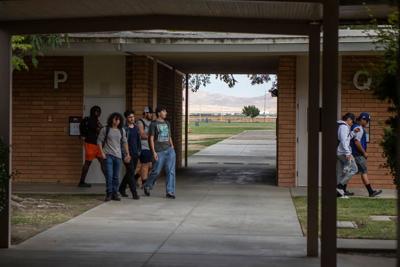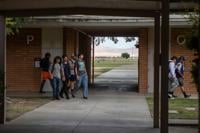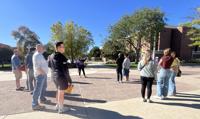
Students walking out of their classes through the hallways at Coalinga College on Oct. 9, 2023. Photo by Larry Valenzuela, CalMatters/CatchLight Local
President Donald Trump has taken aim at students and professors at California’s elite institutions, such as UC Berkeley and UCLA, but community colleges, which enroll the majority of the state’s students, have largely avoided the administration’s ire.
Until recently. The U.S. Department of Education announced on March 27 that it was stopping California universities and colleges from using federal funding to “provide services to illegal immigrants.” The education department is specifically referring to federal TRIO programs, which provide various forms of financial aid and counseling to low-income, first-generation students.
California schools don’t track how many of their students lack legal status. Although exact figures are hard to capture, some estimates, such as the number of applications for in-state aid, suggest that there are thousands of students without legal status, most of whom are attending California’s community colleges.
More than 100,000 students in California are enrolled in a TRIO program, said Dalia Hernandez, the president of a professional association that works closely with these programs. Informally, colleges know that some students in these programs lack legal status. Now campus TRIO officials are grappling with the president’s order and wondering if they are going to have to start documenting citizenship.
Although non-citizens aren’t eligible for federal financial aid, in 2022 the education department granted California special permission to enroll them in TRIO programs’ academic services through September 2026.
Now the administration is revoking that permission.
In a Zoom webinar a few days after the education department’s announcement, Hernandez’s organization, the Western Association of Educational Opportunity Personnel, told college leaders that they could keep serving students in their programs, regardless of immigration status. However, moving forward, schools would need to reject any suspected non-citizen, she said. The federal education department has yet to provide any additional guidance about how to interpret the TRIO policy change.
“I’ve been in 1,000 meetings talking about every executive order that comes out, and every meeting is like, ‘Well, we don’t know what’s going to happen and it’s probably going to get blocked by a federal judge, so just hold on,’” said Brian Boomer, the director of grants at the West Hills Community College District in California’s Central Valley. “This was a little different because they actually gave a directive.”
Outside of California, it’s easy to see why some might argue these federal dollars should only serve U.S. citizens, Boomer said. But in Fresno and Kings counties, where his community college district is located, he said many immigrants are embedded in the community, work in nearby farms, and send their children to the region’s schools and colleges. “That’s the population you serve,” he said. “Our area feeds the country.”
Coalinga College is one of the two schools in his district. More than 70% of its students identify as Latino, and many are current or former farmworkers or children of farmworkers. The college’s largest TRIO program, called Student Support Services, has just under 200 low-income, first generation students enrolled, said Lissette Padilla, who oversees it.
Some of those students likely don’t have legal status, she said, but it’s not clear how many.
A ‘heartbreaking’ change for one student
As a low-income student with a learning disability and the first in his family to attend college, “J” knew he needed help navigating Oxnard College, a community college in Ventura County. He applied to one of the TRIO programs in 2021 but he said he was rejected because program administrators suspected he wasn’t a U.S. citizen. CalMatters has agreed to withhold his name because he fears drawing attention to his legal status.
“I thought this was going to be for all first-generation students,” he said. “I felt like I was abandoned.”
Two years later, after the state got special permission from the federal government, the director of the program reached out to J again, this time to encourage him to reapply. As part of one of the TRIO programs, J got one-on-one guidance with campus counselors who helped ensure that he was on track to meet his academic goals and transfer to a four-year university. The TRIO staff also took him on trips to visit various colleges, including Cal State Northridge, Chico State, and Cal State Long Beach.
Last summer, he enrolled at Cal State Channel Islands, ready to pursue a bachelor’s degree. Many Cal State and University of California campuses offer TRIO programs to their students, but Channel Islands isn’t one of them. “It’s very disappointing,” he said because he was hoping to stay enrolled in one of the TRIO programs.
Even if the university began offering TRIO programs, he won’t qualify if colleges enforce the Trump administration’s policy change. J said it’s “heartbreaking” that students without legal status will no longer have that opportunity to enroll.
In the first few days after the Trump administration’s announcement, schools received little guidance about how to respond and looked to Hernandez, the regional association president, for guidance. She said her interpretation is that TRIO programs are only required to evaluate a student’s eligibility when they first enroll. As a result, she said schools do not need to kick out any students who are currently enrolled, but they shouldn’t register any new students who may lack legal status.
She also recommended that schools revise their intake forms so that students can only identify as male or female. “We’re protecting the programs and the funding that we have,” said Hernandez, referring to Trump’s executive order on gender identity, which prohibits the U.S. government from recognizing gender expansive terms such as non-binary.
Padilla said she’s concerned that Coalinga College may, at some point, need to pull counseling services away from students without legal status who are in the program. She said the contingency plan is to move those students into similar programs that are funded by the state and which don’t ask for proof of citizenship.
Lizette Navarette, the president of Woodland Community College near Sacramento, said she was wary of the initial decision to allow students without legal status to receive services through a federal program. “There was some concern about how safe the student data would be because it’s a federal grant,” she said. For over a year now, her college has been directing those students to state programs, which she said often have more capacity and which don’t share data with the federal government.
Will TRIO get cut?
In 2021, the national association for TRIO administrators, the Cal State University system, the UC system, the California Department of Education and more than 80 other organizations signed a letter addressed to the U.S. Department of Education, calling on it to allow students without legal status to enroll in TRIO programs.
But over the years, support has waned.
The federal government allowed California to expand access to TRIO programs as part of a pilot, which was slated to end next year. In 2023 and 2024, when the U.S. Department of Education discussed expanding access in other states and in a more permanent way, California’s institutions once again voiced their support. But the national association was silent, said Antoinette Flores, the director of a higher education research team at the think tank New America.
She said the association, known as the Council for Opportunity in Education, fears that allowing students without legal status to participate could elicit more scrutiny from the Trump administration and put the entire program at risk. The association didn’t respond to CalMatters’ request for comment.
“We have had, over the years, very strong bipartisan support for federal TRIO programs,” said Hernandez, who also serves as the regional representative of the national association. But she acknowledged that nothing is certain. “There is rhetoric from the current administration about dismantling these federal programs.”
She said her regional association still wants to include all low-income, first-generation students in TRIO programs, including students without legal status, but other colleges and universities outside the state may have a different perspective. “California is one of the very few states in the country that has resources and support earmarked for undocumented students and youth. Others may not have as much.”











(0) comments
Welcome to the discussion.
Log In
Keep it Clean. Please avoid obscene, vulgar, lewd, racist or sexually-oriented language.
PLEASE TURN OFF YOUR CAPS LOCK.
Don't Threaten. Threats of harming another person will not be tolerated.
Be Truthful. Don't knowingly lie about anyone or anything.
Be Nice. No racism, sexism or any sort of -ism that is degrading to another person.
Be Proactive. Use the 'Report' link on each comment to let us know of abusive posts.
Share with Us. We'd love to hear eyewitness accounts, the history behind an article.